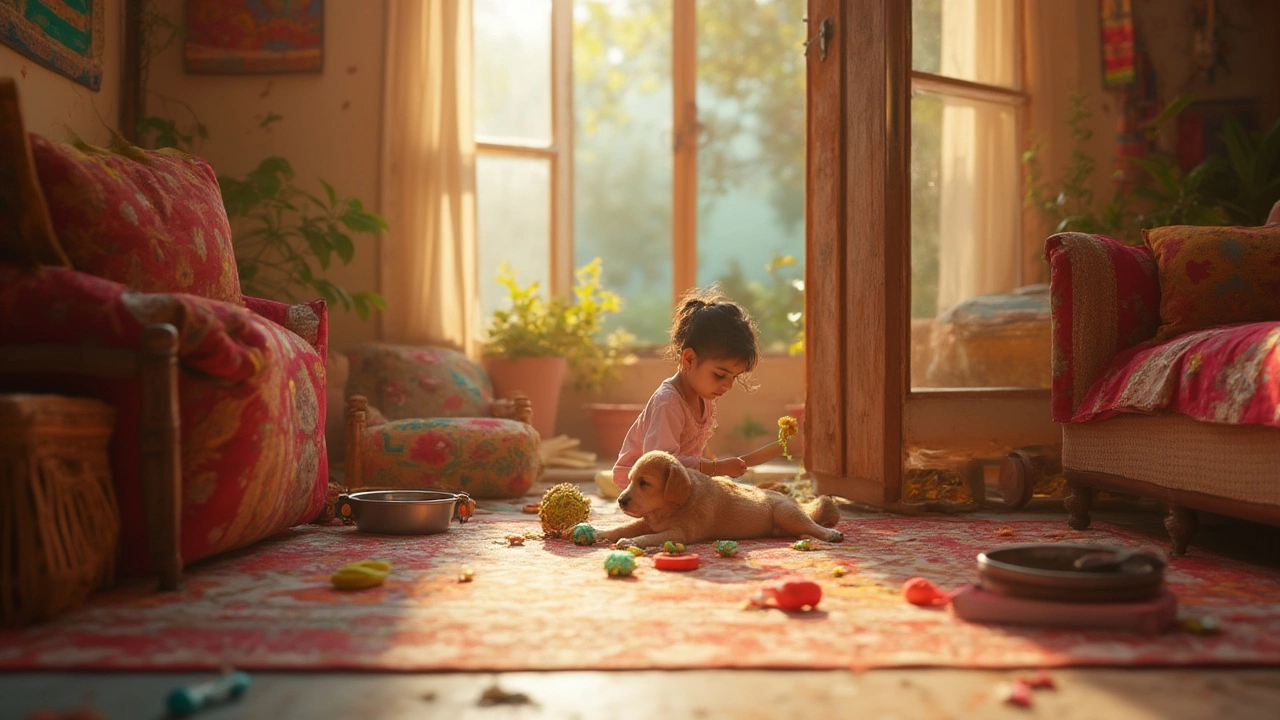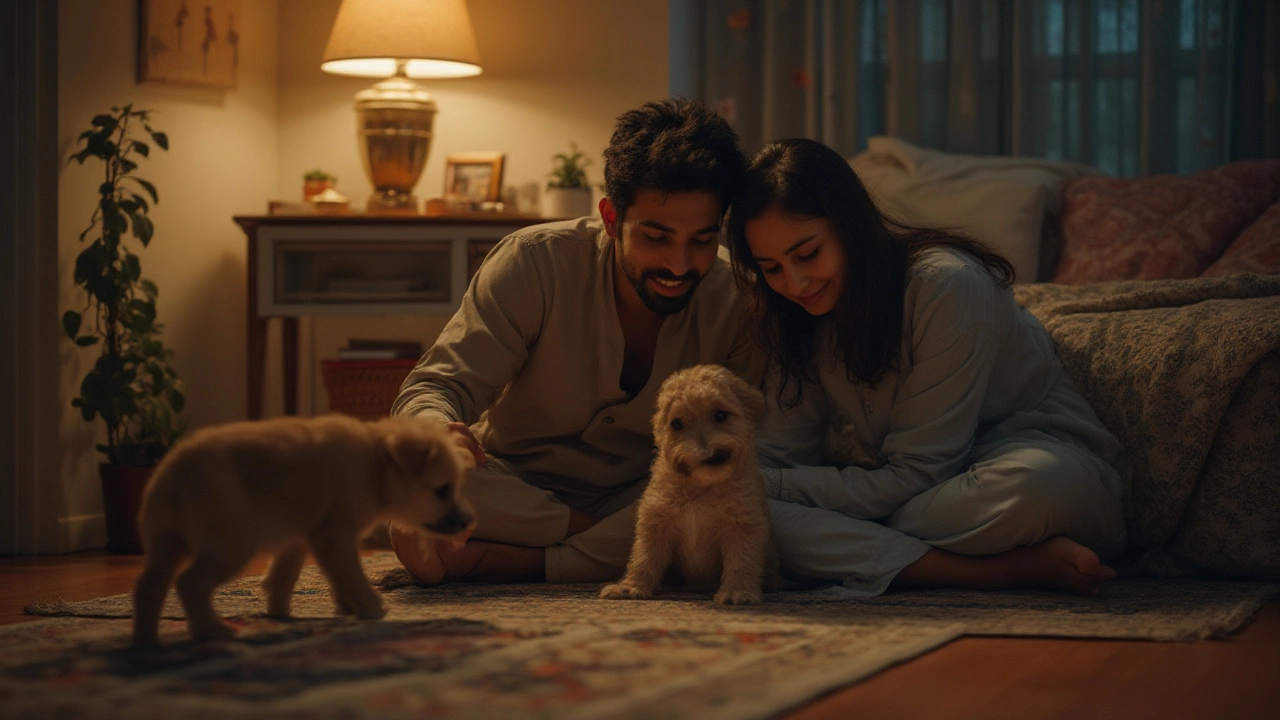
Two days. That’s how long it takes for your whole world to turn upside down when you bring home a new puppy. You may feel a burst of excitement, but there’s anxiety hiding just behind it. Can you really handle all the whining, nipping, and mysterious bathroom habits this fluff ball brings? The first 48 hours with a puppy aren’t just about loving your new pal. They’re about making smart choices and keeping your sanity when everything feels a little out of control.
The First Hour: Setting the Stage for Success
Your puppy’s first steps into your home are huge—kind of like landing on the moon, but with more accidents. Before you even bring the pup inside, double-check your prep. Is your puppy’s crate in a quiet spot, away from too much noise and foot traffic? Did you get the same food the breeder or shelter used? If not, a sudden switch can wreck your puppy’s stomach and your floors. It’s a real thing: puppies are creatures of habit, and even water bowls in a new place can stress them out.
When you first walk in, keep your house calm. Limit the welcome party to just your household. If you’re anything like me and Rowan, everyone wants to see the new puppy, but trust me—wait on visitors for a couple days. Let the puppy sniff their new world at a slow pace, on their terms. Puppies see the world mostly through their noses, so let them take their time. Offer a bathroom break outside before you even enter—lots of accidents happen in that first five minutes.
Keep the starter essentials close: pee pads, a few safe chew toys, bowls of water, and puppy-friendly treats. Put up baby gates if you want to keep certain rooms off-limits. Puppies are escape artists, and it takes shockingly little for them to get stuck somewhere or gnaw something they shouldn’t.
Managing Stress (Theirs and Yours)
The truth is, your puppy isn’t the only one stressed out. These first two days test your patience, especially when you realize how tiny puppy bladders really are. New puppies need to pee every hour or two, including the middle of the night. It sounds exhausting—and it is—but sticking to a bathroom routine early on pays off. Since accidents in the house quickly become habits, make a schedule and stick to it religiously.
Keep everything consistent. Meals, potty breaks, naps—puppies feel safest when they know what’s coming. Do yourself a favor and write down a feeding and potty plan, then stick it on the fridge. Even a homemade spreadsheet works. And don’t be afraid to wake up your puppy to take them outside on day one. It feels mean, but missing an accident is worse.
The first night is the hardest for everyone. Your puppy’s whole world has changed—no more siblings, no more familiar smells. Expect crying. Most trainers say to keep your puppy’s crate close enough that they can see and hear you, but not in your bed. If you put a T-shirt you’ve recently worn in the crate, the smell helps the puppy calm down. White noise or soft music can also soften that scary silence.
For yourself? Take shifts with someone else if you can. Rowan and I traded off those outdoor trips and let each other catch up on rest. Just knowing there’s a plan—even if it’s a tired, stumbling one at three in the morning—helps your stress level too.

Feeding, Hydration, and Puppy Stomachs
Food and water are basics, but puppies bring surprises with every bite. For the first two days, keep the same type of food they had before. If you have to change brands, do it gradually: new food should make up only 25% of their meal for the first few days. Rapid changes can cause diarrhea—no one wants to clean that up at 2 AM.
Feed your puppy three to four times a day. If they’re especially small or young, you might want to go for four to five tiny meals. Free feeding (leaving a bowl out all day) can make house training almost impossible. After eating, puppies almost always need to potty within 5-15 minutes, so build that into your schedule.
Don’t let treats make up more than 10% of their daily calories. That’s today’s dog health fact: too many treats in the first couple days can upset digestion, especially with all the newness around them. Make water easy to access but watch for over-drinking. Excessive water, particularly after nervous play or accidents, can make bathroom training harder.
Pay extra attention to your puppy’s poop. It might feel gross, but it actually gives you real info. Soft, loose stool after a stressful day or a car ride is pretty normal, but if you see blood or your puppy won’t eat or drink, call your vet right away. Puppies can get dehydrated fast. If you ever want to check hydration, pinch the skin behind the neck—if it drops back quickly, you’re good. If it stays up, it’s time for action.
Building a Bond: Handling Play, Touch, and Sleep
Your puppy is learning everything from scratch, including who you are and whether you’re safe. For these two days, keep play gentle and simple. Forget complicated tricks or flashy games. Instead, just sit on the floor with a squeaky toy or a soft blanket and let your puppy come to you. The more you force attention, the warier your puppy will become.
Touch is the foundation of trust. Stroke behind the ears, gently rub their back, and offer soft pets, but never chase or grab a nervous puppy. Puppies bite—not because they’re aggressive, but because it’s how they explore. Redirect that nibbling to a toy every time. Over time, your puppy learns people aren’t for biting. If they get too wild, a gentle “ouch” in a high-pitched voice mimics their siblings and can even help correct those tiny shark teeth.
Sleep is just as essential as play. Puppies can sleep 18-20 hours a day, so don’t panic if they’re conked out more than they’re awake. Provide a space that’s draft-free, away from doors and loud noises, and always put them back in their crate or pen after active play. Don’t worry if your puppy whines a little; it’s all part of the adjustment.
If you want to build trust quicker, try “hand feeding” a few regular kibble meals. Your puppy will learn to associate your hands with good things, and those gentle feeding moments become special fast.

Health, Habits, and Surprising Firsts
Puppies are a lot like toddlers—everything is new, so you’ll see weird habits pop up. Sometimes your puppy might hiccup, sneeze, or even get the “zoomies,” those wild running sessions. Don’t worry, it’s normal. What isn’t normal: coughing, nose bleeds, lack of appetite, or sitting huddled away from you. Call your vet if you see any of those things.
If your puppy hasn’t had their shots, don’t take them into public areas just yet. Parvo and distemper are real risks. Only visit safe, clean spots for potty breaks during these early days. Disinfect high-traffic areas in your home, and don’t let shoes or bags from outside wander into your puppy’s play area.
Start handling your puppy’s paws, ears, and mouth early. Gently touch their feet so nail clipping later is easier—not every puppy will love it, but early and consistent exposure helps. Take note: puppies often hate collars and leashes at first, so keep initial sessions to a few minutes, turning them into a treat party.
If you haven’t booked a vet check yet, line one up within a few days. New puppies need a clean bill of health and answers about what’s next for vaccines and parasite checks. And while it feels like you’ll never sleep again, your puppy will settle in. They’ll learn. So will you. The first 48 hours test your patience, but each moment also builds a foundation for the years ahead with your new best friend. That wild welcome is just the start of the adventure.
